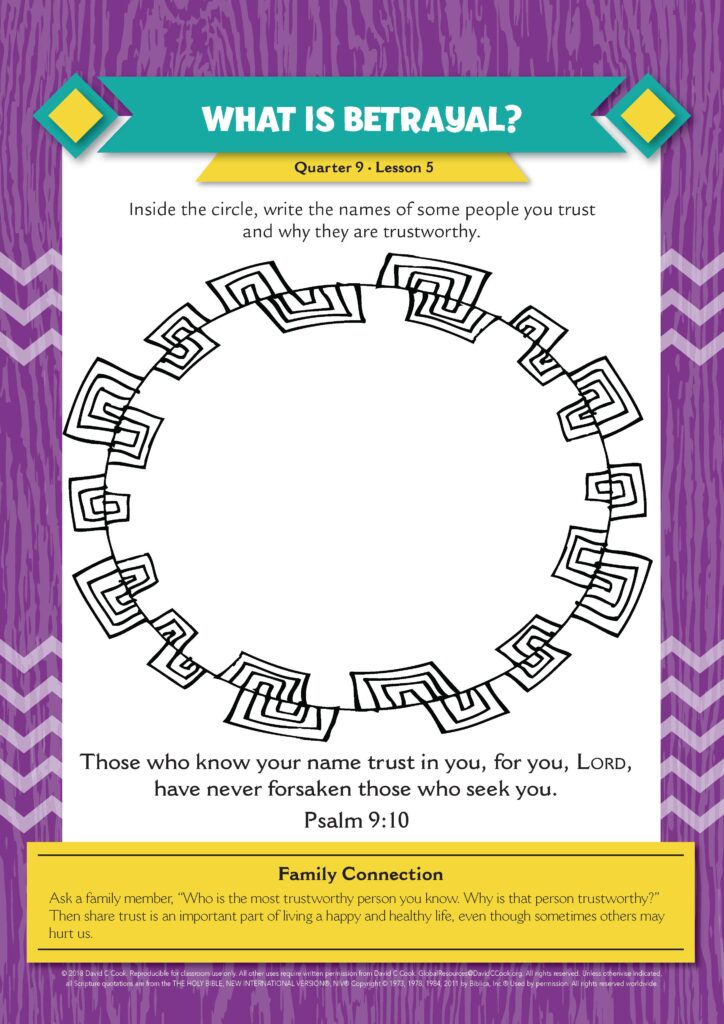During the lesson, the information for you to know is written in regular type, and what we suggest speaking or reading aloud to children is in bold. All resources for this lesson, including the Teacher Guide, Student Page, Family Connection Card, and other resources can be downloaded in a ZIP file by clicking on the following link:
In some lessons you will find "resource articles." These are articles written by experts from around the world to help equip you for your work with children and adolescents. Share them with parents or guardians if you consider it appropriate.
It is better to take refuge in the Lord than to trust in humans.
Psalm 118:8
When we trust others, we will probably experience betrayal at some point in our lives. Sometimes our trust is betrayed through carelessness or lack of awareness. This type of betrayal is usually easy to forgive, as the betrayal was unintentional. But other times, trust is broken in intentional, hurtful, and unexpected ways, causing deep emotional wounds that heal slowly and painfully. In these situations, forgiveness does not come easily and often trust is never truly restored. But without trust, we cannot experience meaningful relationships with others, so we have to learn to trust again.
When we experience the pain of betrayal and the feelings of helplessness and hopelessness that often come with it, we can put our trust in the One who will never betray us. When we need to find the strength to trust again, we can ask God, whose steadfast love for us will never change even when we betray Him. Spend some time meditating on this truth. He loves, He forgives, and He heals. When trust is broken in your human relationships, seek the refuge of your loving God, knowing He will be your strong defender, and He will help you to trust again.
Encourage the teens to ask family members about the most trustworthy people they know and why those people are trustworthy. The teens can then share that trust is an important part of living a happy and healthy life, even though sometimes others may hurt us.
Teacher Tip: If possible, email or text the Family Connection Card to the families of your students.
As you greet the students, ask them why trust is important. Allow 2–3 students to share their ideas with the whole class.
Divide the teens into 2 groups: boys and girls. Have each group form a tight circle by standing shoulder to shoulder, with arms stretched out in front of them. Pick 1 teen to stand in the middle and cross his arms across his chest. He should keep his body stiff like a board and lean back into another person’s arms. This student will be passed from 1 person to another by the shoulders until he has gone all the way around the circle. If you have time, you can do this several times with different teens.
After the activity is over, have the students sit down for a discussion. Ask the teens who were passed around the circle the following question.
How easy or difficult was it to trust those in the circle not to drop you?
Was it easier after you had been passed safely a few times? Why or why not?
In our activity, the person who was passed around the circle had to trust the others to pass her along gently and not drop her. If she had not trusted those in the circle, she would have stood up or been dropped. Trust is an important part of life. Every day we trust that others care about us, will keep their promises, and will not harm us.
But sometimes we may trust the wrong people or discover that those we trusted have done things to mislead us or hurt us. This is called betrayal. Betrayal breaks trust and damages relationships.
We all need and want to trust others. Trust helps us to feel safe and secure in our relationships and in our lives. It also helps to deepen our relationships and gives us confidence to face difficulties.
Allow 2–3 students to share their thoughts.
Trust has great value in our lives. But when our trust is broken and we are betrayed, it hurts deeply. Understanding why the other person betrayed us may not lessen the pain. Even if the person apologizes, it can be difficult to heal. And when feelings of betrayal damage a relationship, that relationship is often changed forever.
Sometimes we feel that someone has betrayed us, even if they have not. This can cause the same kind of pain, and the healing process can be difficult.
Because we trust others, we will probably experience betrayal at some time in our lives. Unfortunately, we will probably also betray someone else. Because we are all human and we all sin, sometimes we all treat others in ways that are hurtful or dishonest.
Listen to what the Bible tells us about betrayal.
Have a student read Psalm 41:9 aloud from the Bible. If that is not possible, the passage is printed here.
Even my close friend, someone I trusted, one who shared my bread, has turned against me.
Psalm 41:9
Who has betrayed the writer of this verse?
Invite 2–3 teens to share their thoughts. They might say the author feels betrayed by a close friend whom he trusted.
What emotions do you think the writer is feeling?
Invite 2–3 teens to share their thoughts. They may offer answers such as angry, hurt, sad, or afraid.
Listen to what else the Bible tells us about betrayal.
If an enemy were insulting me, I could endure it; if a foe were rising against me, I could hide. But it is you, a man like myself, my companion, my close friend.
Psalm 55:12–13
How do you think the writer feels about being betrayed?
Students may give answers such as hurt, surprised, or angry.
Why does the writer say that the betrayal hurts so deeply?
He was betrayed by a friend whom he trusted.
Betrayal hurts deeply because it destroys trust and damages relationships. Betrayal hurts because it only happens in trusting relationships with others. When someone we trust mistreats us, we feel angry, hurt, vulnerable, and afraid. Betrayal can happen with a friend, a family member, a leader, or anyone we trust.
Listen as I read a few examples of betrayal.
In this situation, you would probably feel betrayed. But what if the thing you had told your friend was something dangerous to you or to someone else? What if you had told your friend you were considering beating up someone who had stolen from you or that you had been sending pictures of yourself on social media to a man you did not know? It is possible that your friend did not intend to betray you. Your friend may have been trying to protect you.
Would that change your feelings about your friend or about the situation? In what ways?
Here’s another difficult situation.
No one was actually betrayed, but you may feel betrayed by God because He did not answer your prayers the way you wanted Him to. You may also feel that God betrayed your sister.
In a situation like this one, you may feel betrayed by your sister for leaving you, even though it was not within her control. It is normal to have these kinds of feelings when we lose someone we care about or when we feel we have no control. But in this situation, you may also feel that God has betrayed you because He did not heal your sister.
Do you think God ever betrays us? Why or why not?
Allow 2–3 students to share their thoughts. Do not correct them. They will learn about God’s steadfast love in the next part of the lesson.
Sometimes we feel God has betrayed us because He does not do what we want or expect Him to do. But God never betrays us. He is not obligated to be faithful to us, but He is always trustworthy, always good, and always faithful. Listen to what the Bible says about His love for His people.
If you are using the Memory Verse Poster, show it to the students.
But I will not take my love from him, nor will I ever betray my faithfulness.
Psalm 89:33

No matter what happens in our lives, God is always loyal, loving, and unchanging. His love never changes. Though people will make mistakes and poor choices that hurt us, we can trust God to always treat us lovingly and justly. The Bible tells us that we can always trust in God, even when others disappoint us.
It is better to take refuge in the Lord than to trust in humans.
Psalm 118:8
Although people may let us down, we can always trust in God. He is our refuge when others hurt us and disappoint us. He will never break our trust.
We should be careful in our relationships and choose carefully whom we will trust. The only way to completely protect ourselves from betrayal is to stop trusting others. But if we choose not to trust others, we will be isolated and alone. We will not have others to share our joys or to help us when we face challenges. This is not how God intends for us to live. His plan is for us to love one another and help one another.
Listen to what the Bible says about our relationships with others.
Therefore encourage one another and build each other up, just as in fact you are doing.
1 Thessalonians 5:11
Have the students stand in a circle with their arms interlocked at the elbows so they are all connected. Join the circle with your students to show them that they can trust and depend on you.
In this group, we are all connected. We are all learning to trust the others in this circle, and we are all learning to be trustworthy. When we are kind and encouraging to one another, we build trust. When we feel cared for and encouraged, we begin to trust others. We will go around the circle and take turns saying encouraging things. You can give words of encouragement to a specific person or to the whole group.
Optional: If you are using the Student Pages, the students can complete the activity on their pages.

Give the students a few minutes to share their encouraging words. Allow as many students as possible to participate. Praise the students for their encouraging words.
Though we care about each other, we may hurt or disappoint each other. But there is someone who will never betray us. God is always good and always faithful. We can go to Him for comfort when we feel betrayed. Listen to what the Bible tells us about God’s trustworthiness.
Those who know your name trust in you, for you, Lord, have never forsaken those who seek you.
Psalm 9:10
Invite the students to bow their heads and close their eyes, remaining in the circle with their arms interlocked. Then invite them to offer 1-sentence prayers for each other and for the group. Then close with a blessing based on Psalm 9:10:
Blessing: May you know the name of the Lord and put your trust in Him, and may you find comfort in knowing that He will never forsake you.
Lead the children in singing this quarter’s song, if possible.
Life on Life ©2020 David C Cook. Reproducible for home or classroom use only. All other uses require written permission from David C Cook [email protected]. All rights reserved.